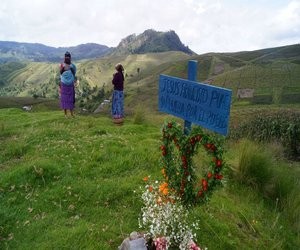 No one can understand Guatemalan society without looking at the consequences of state orchestrated oppression. These consequences include women being treated as spoils of war. The Report on the Recuperation of Historical Memory and other documents, like the ones produced by Jesuit anthropologist Ricardo Falla, document the violations of women’s human rights.
No one can understand Guatemalan society without looking at the consequences of state orchestrated oppression. These consequences include women being treated as spoils of war. The Report on the Recuperation of Historical Memory and other documents, like the ones produced by Jesuit anthropologist Ricardo Falla, document the violations of women’s human rights.
The 36 years of so-called armed internal conflict—a conflict that Marta G. González Molina [1] prefers to name “the war of shame”—are defined by arbitrary acts by the State and a string of presidents. In short, these acts resulted in an unequal distribution of wealth that a group of idealistic young people thought they could turn around through guerrilla fighting.
The State of Guatemalan implemented a scorched-earth policy with the intention of repressing the guerilla fighting. This policy ended the lives of thousands of women, men, children and elderly people in rural parts of the country with such systematic cruelty that it can only be classified as genocide.
The greater part of the victims of the so-called “armed internal conflict” were women and children, unarmed members of the civil population.
This is a society whose wounds have not healed. The 2011 elections put a member of the military linked to genocide and repression in the Ixil region, Otto Pérez Molina, in power. In a post-conflict country that was on a shaky transition toward democracy, many people knew that electing this president meant taking painful steps backward.
After that, the International Commission Against Impunity revealed that a network of state functionaries had been using its position to make illicit business deals and to get rich at the cost of the public treasury. Disillusionment flourished. The urban population that had voted for Otto Pérez Molina spilled onto the streets in citizen’s protests and sit-ins at the National Palace. People demanded that the president resign. They tore at their garments and publicly lamented their poor choice. Of course people who had not necessarily voted for the repudiated general also participated in these protests.
The government led by the retired general Otto Pérez Molina is getting close to its end. Elections are scheduled for September 6. The climate is one of uncertainty and doubtful credibility. There are people who openly prefer a coup d’etat to an electoral process. They use the slogan “in these conditions we don’t want elections.”
This is a citizenry that stayed indifferent during 36 years of indiscriminate repression, genocide and massacres. This is a citizenry that is now repenting of its sins and rending its clothing in the public plaza, shouting mea culpa and weeping. We feel more on the brink of a precipice than on the brink of elections.
I believe that the elections should take place among a very broad range of candidates, and that we should vote for the one our good or bad conscience dictates, as two and a half million people already did before when they elected Pérez Molina. Poor decisions always have consequences.
When we have a new government, we should exercise active citizenship and social auditing. We should put pressure on the government so that the country moves in the right direction, or at least so that we prevent a group of functionaries from dumping out the public treasury. The only way to face this crisis is through organization. But we can’t have spontaneous organization. Our organization must obey principles, ethics and a national project.
Maybe we’re seeing the light at the end of the tunnel.
Guatemala, August 11, 2015.
Notes:
[1] Guatemala: el martirio de una reina y la guerra de la vergüenza. España 2011.
Walda Barrios-Klee is the coordinator of the Gender and Feminist Studies Program at the Latin American School of Social Sciences or FLACSO, Guatemalan academic branch, and a member of the Women’s Association for Feminist Studies or AMEF.
Translated by Jenny Marie Forsythe
Photo: Mariana Toscano



